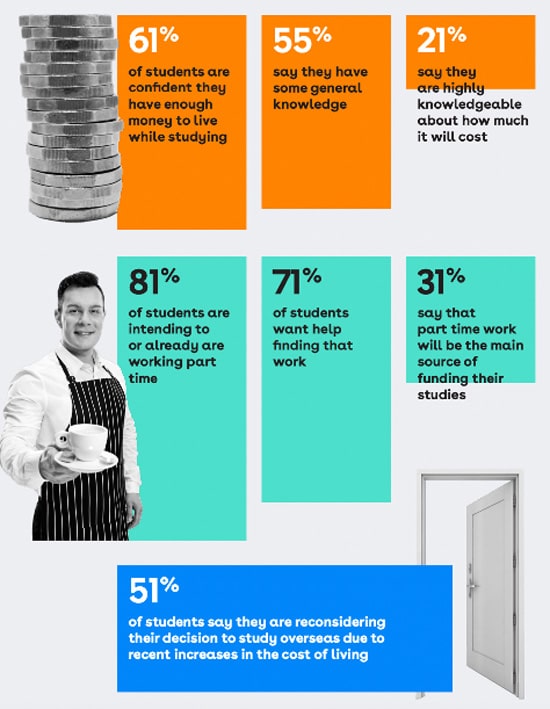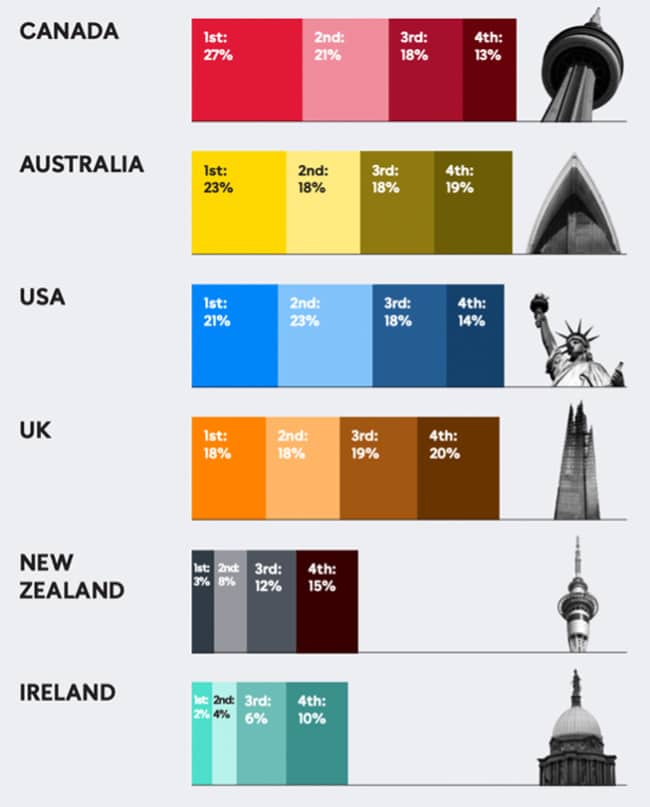Global survey shows rising costs of living are significantly affecting international student mobility
- A global survey from IDP highlights that rising costs of living are weighing heavily on the families of international students
- Many students are having to reconsider their decision to study abroad as a result
- Students are looking for opportunities to work part-time during their studies to help them afford to live in host countries
- ICEF Monitor first reported on this trend in 2022, after agents told us that that the ability to work during studies had become even more important to many prospective students than post-study work opportunities
- Fully 3 in 10 told IDP they expect part-time work to be their main source of funding
- In-study work policies are therefore an instrument that destinations may increasingly consider as they compete for students in emerging destinations
- We look at part-time work policies in 7 major destinations
International student mobility continues to gather steam after the pandemic, but another threat has emerged this year. A global survey of 21,000 students in 108 countries conducted by IDP reveals that escalating costs of living in 2023 pose a major issue for students hoping to study abroad.
As students’ families struggle to make ends meet, they may have to forgo or defer plans for overseas study – or choose Plan B options that are more affordable than their #1 preference. Fully half (51%) of surveyed students said they are reconsidering their decision to study overseas.
We saw how the pandemic altered flows of student mobility – e.g., with students choosing countries with looser border restrictions or vaccine requirements – and we will likely see the cost-of-living crisis have a similar disruptive effect on the international education landscape. Intra-regional mobility may increase as a trend, and less expensive destinations (e.g., South Africa, Egypt, Morocco) may find it easier to compete this year for students.
IDP conducted the Emerging Futures study in February and March 2023. The top countries in the sample, in terms of total participants, were Nigeria, India, China, Ghana, Philippines, Pakistan, Kenya, Nepal, Bangladesh, and Indonesia. This list includes some of the most emerging sending markets today, and IDP’s ability to secure a significant volume of students from Africa reflects their growing presence in that region.
The majority of surveyed students were not yet studying abroad; 36% were prospective students and 43% had applied to one or more institutions. Most were considering post-graduate studies (57%) or undergraduate programmes (25%).
Tighter budgets will increase focus on part-time work policies
Only 61% of students indicated that they were confident they had enough money to live in a host country while studying – leaving 4 in 10 students who weren’t so sure they could do so. A very high proportion – 81% – are intending to or are already working part time, and a noteworthy proportion (31%) said that part-time work will be the main source of their funding.
The implication is clear: for most of the students surveyed, the ability to work part-time will be a crucial determinant of their study abroad decision-making. Those destinations with more generous work-while-studying policies have a distinct competitive advantage in 2023 (keep reading for more on current in-study work policies across destinations).
Universities, too, should take note of the findings. More than 7 in 10 students who want to work part-time said they want help finding jobs – indicating that this may be a service more institutions need to offer. University recruiters should also be prepared to offer clear guidance about the costs of studying and living in their city – only 55% of students said they had general knowledge about how much money they will need to afford study abroad, versus 21% who feel they are “highly knowledgeable.”

The study findings raise a worrying possibility that students abroad may end up very poor while they study, even to the point they cannot afford enough food or drop out due to insufficient funds. International students are already well represented at food banks in top destinations, and this year’s affordability crisis may worsen that trend. This reinforces the responsibility of university recruiters to be clear about the costs of study and living in a host country/city.
The findings also reveal that students in emerging markets will be especially influenced by tuition discounts, scholarships, and relative costs of living. More affordable host countries, smaller towns in top destinations, and 2+2 arrangements (i.e., two years of college then two years of university) stand to be more popular this year.
Canada still the most popular
Canada remains the #1 destination for most students according to IDP. More than a quarter of respondents (27%) said Canada was their preferred choice, while 23% and 21%, respectively, said the same about Australia about the US. The UK trailed at 21%.
Many students are open to considering other destinations outside their first choice, however. The chart below shows that the top four leading destinations are all popular contenders.

Will we see in-study work policies change?
Over past couple of years, Canada and Australia extended their in-study work policies to fill labour shortages. It is no coincidence that (a) Canada remained popular throughout the pandemic and (b) Australia’s recovery after a prolonged border policy was boosted by more generous in-study work rights.
As it stands, Australia ended its policy of letting international students work more than 40 hours a fortnight in any sector of the economy on 30 June 2023 (the cap is now set at 48 hours).
Meanwhile in Canada, international students meeting certain conditions may work more than 20 hours per week off-campus while class is in session. The intended end-date for this policy is 31 December 2023. In holiday breaks, international students may work overtime or work two part-time jobs that add up to a higher than usual number of hours.
Here are current in-study work allowances for other popular destinations:
Germany: Non-EU students can work 120 full days or 240 half-days per year without the consent of the Federal Employment Agency
Ireland: Non-EU students with a Stamp 2 permission to remain can work up to 20 hours a week during term time and up to 40 hours a week in the holidays.
New Zealand: International students in higher education may work up to 20 hours a week if they are doing a full-time course that:
• Is at least 2 academic years in duration
OR
• Results in a New Zealand qualification that gains points under the Skilled Migrant Category
OR
• Is at least 1 academic year in duration and part of an approved tertiary student exchange scheme.
International students pursuing research-oriented master’s or PhD programmes do not have any limits on how much they can work.
Many full-time international students in New Zealand can also work full-time during scheduled breaks in study.
UK: International students can work up to 20 hours per week during university term time and full time in breaks and holidays.
US: The US is much more restrictive than the other destinations re: in-study work rights. Details can be found here.
For additional background, please see:
















